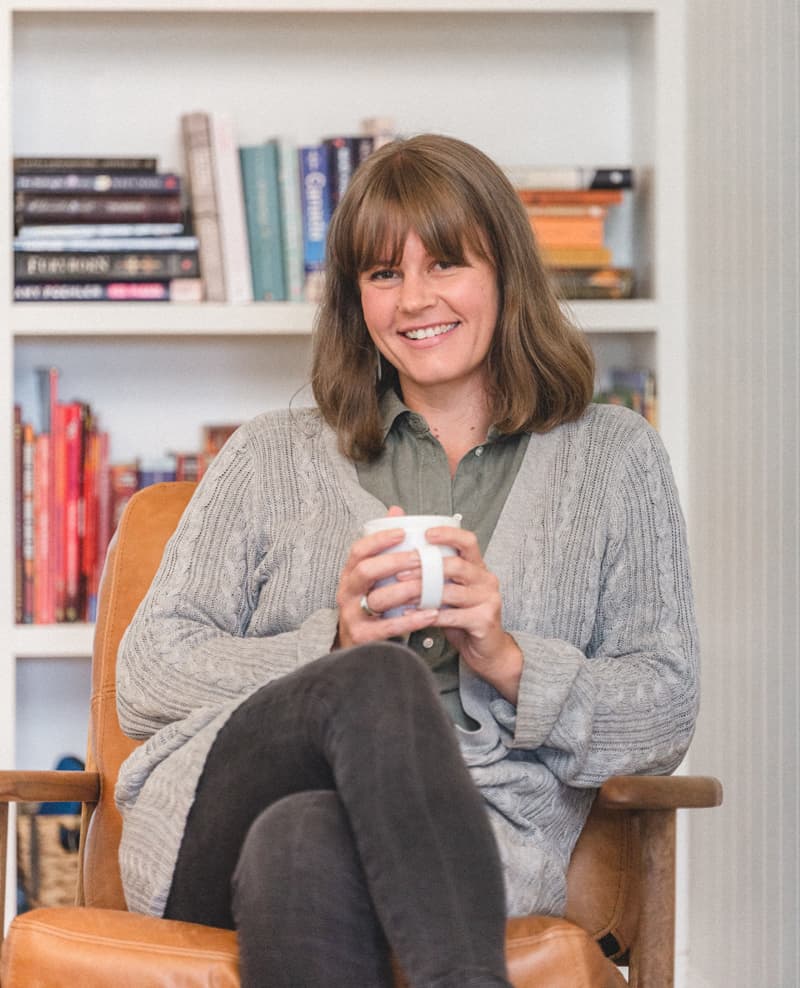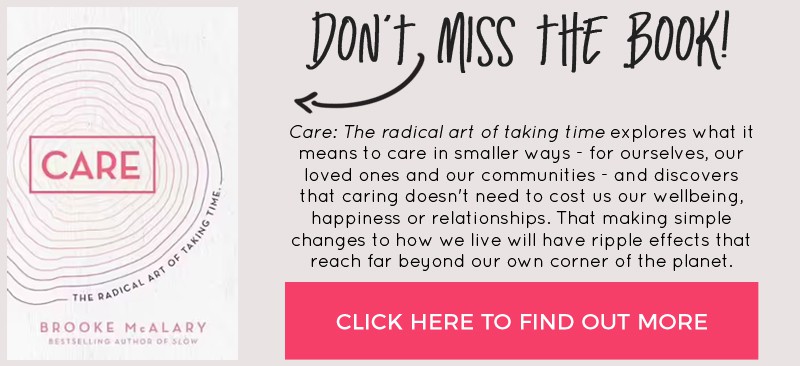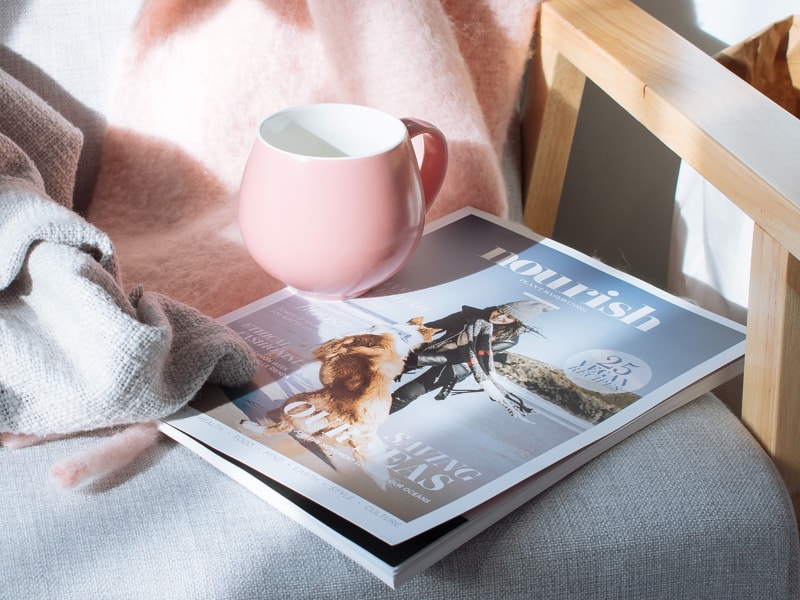There’s something to be said for a bubble bath when you’ve had an exhausting day. Nothing quite like sinking into those popping bubbles, preferably with a glass of bubbles to accompany your little time out. That said, when it comes to nourishing self-care these days, a bubble bath just doesn’t quite have the cut-through it had when the kids were younger.
“When my kids were really little and the demands on me more urgent, I feel like I needed more acute self-care, if that makes sense,” says Brooke McAlary, author of the newly-released book Care. “Things like alone time, a sleep in, a day at home to just potter around and get things done. And I think those things felt like care because they were so rare.”
Which was the true beauty of the bubble bath – time alone. Without kids on you. Just the bubbles.
Less urgent, more complicated
“As they get older, the demands of parenting become less urgent, but more complicated.” says Brooke. “I’m finding there’s a bigger emotional ask as a parent of tweens, and probably teens too! I feel like I need more nourishing types of care.”
More complicated: 6 ways I’ve changed how I’m parenting the teen years
For Brooke, nourishing self-care means things that allow her to spend time in her own inner world. “Tending to my own heart and checking in with myself,” as she puts it.
These are things like waking early, barefoot bushwalks, journalling and yoga classes, although she says that “no doubt it will keep changing as life keeps changing, which is why I think it’s so important to have some form of self-care that gives me time to reflect on what’s working in life, and what needs to be reassessed.”

Brooke McAlary is the best-selling author of three non-fiction books: Destination Simple, SLOW and now CARE. She is also the creator of the #1 podcast, The Slow Home Podcast, where she talks to interesting people about what it means to live slow in a fast-paced world.
Nourishing self-care is really about values
When it all comes down to it, truly nourishing self-care is taking the time to be with things that we value. This might mean journalling every morning for some, or spending time at the beach or in the bush for others. It might be spending Tuesday nights volunteering at a women’s refuge. Or taking a daily walk with the beloved family dog.
This is reflective time, just taking a moment out of the busyness of life to pause, think, plan and remember.
This is time that was almost impossible to come by when our kids were younger, but is hopefully more available to us these days. We can step out the front door and leave our older children to take time away for ourselves. In fact, we are doing them a favour every time we show them that we are taking the time we need.
It’s okay to rest
“Showing your kids that it’s OK to rest is probably one of the most powerful lessons we can teach them,” says Brooke. “To help raise a generation of kids who don’t immediately feel guilty any time they feel tired or in need of rest is to set them up with an understanding of their humanness.
We’re not machines, we’re not fixed in our energy and capacity, and yet we live in a world that seems to expect that of us.”
Brooke explains that she leads by example to show her children that it’s okay to set down life’s burden and not feel guilty about it. She might lie in on a Sunday morning without being on her phone. Sit in the park and watch the people go by. Or go for a slow, meandering walk without purpose or a destination in mind.
“If we help normalise these things I hope our kids can grow up with a strong foundation of care, for themselves and by extension, for the people they love,” she explains.

Together and alone
There are no rules about what self-care should and shouldn’t be. It’s completely up to you to decide what fills your cup and helps you care for yourself. Nourishing self-care might be spent alone, or with others. Your significant others in some cases, but not always.
For me, self-care has always been about taking time out on my own to reflect on what’s important in my life. Instead of rushing through all the things, I try to carve out time to go slow and be more present and observant in my day to day life. I outlined what that looks like for me here and here.
Also this: This is how I take a week off when I really need it
Ironically, my nourishing self-care is also about bringing people together. Even though I’m a committed introvert at heart, I feel happiest when I’m connecting with people, whether that’s my family, friends or volunteering in my community. I mean, I need a lie down for a day to get over the drain of peopling, but I’m never regretful. The energy of connection is something that fills me up to the brim.
Connection is different for everyone
In her book Care, Brooke outlines nine core categories of care in her book one of these is connection. As Brooke explains, it’s important to remember that the value of connection can look different to each family member.
“Connection might look like deep, genuine online relationships for your kids,” she says. “Even though you’ve role-modelled the importance of in-person community and connection, they may find that sense of belonging with a group of people who live on the other side of the world, and that’s okay. That’s their version of connection.”
Giving everyone the space they need to nourish themselves in the way that suits them best is the most harmonious way to support our kids’ own need for self-care.

6 nourishing self-care ideas to try
As for our needs, Brooke has these tips to help us give support to ourselves as we supports our children:
- Practise three deep, diaphragmatic breaths
- Try a thirty-second mindfulness meditation by studying one of your five senses. What can I see, taste, hear, feel or smell?
- Try a stream of consciousness journal entry – just sit and write whatever comes to mind, with no censoring or judgement
- Make yourself a tea and sit on the front step as you drink it, watching the world go by
- Talk to a friend about doing a weekly kid-swap or cooking a meal for each other once a fortnight
- Eat breakfast for dinner and, in the time you save, take a bath or sit outside with a drink.
Five more ideas here: 5 gentle ways to for mums to practise self-kindness
“Recognise there is a tension between our desire to care for our family and our need to rest,” she advises. “So we need to learn how to hold space for two opposing ideas at the same time. It’s one of those messy truths of being a mother.”
The key is to acknowledge the push-pull and give yourself the space in between for restoration. Push-pause-pull. The more you do that, the more you will have in the tank to offer yourself, your children and any other commitments.
“After all,” says Brooke. “If we’re burnt out, we’re not able to show up in the way we’d like.”
Care by Brooke McAlary, Allen & Unwin, RRP $32.99, available now. For a limited time, you can buy a signed copy for 20% off at Booktopia.

Brooke McAlary image supplied; Feature image by Jess @ Harper Sunday; cliffs by Mariah Hewines; friends by João Gabriel Amorim Antunes

